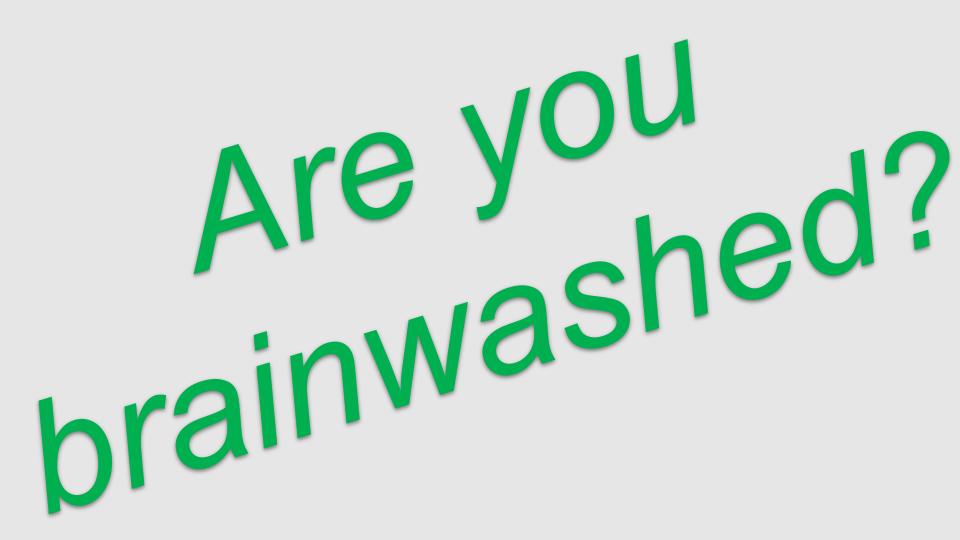In today’s world we tend to be skeptical about so many things, yet we fall for the stupid things. At least I feel that way.
We often believe some stranger while we’re grilling a friend over a statement they made. Then we look at what our parents said when we were 5 years old and think that’s gospel. My GOD! It’s no wonder we’re so messed up.
We often think that because we read it on Facebook it’s reality. Maybe on X formerly Twitter. Maybe on LinkedIn. We see some obscure thing on a website that sounds credible and suddenly it’s fact.
Listen, I am not judging because I fall into that trap all the time. However, it’s not just conspiracy theories I am talking about. I try to get market reports, look up credible reports and listen to people in the industries. Unfortunately we all fall into the ame trap.
We can trust but we have to verify. We have to talk to a lot of people to see what the real story is. I often take people at face value, but we just have to get more information and piece the story together ourselves.
Even in tech we have to do extensive research to understand why each person wrote what they did. Most things we read are sponsored by someone larger.
Think about how much medical advice we take only to find out years later that large corporations would pay the researchers to form the opinion that it followed their message. I was reading a report, Sports sponsorship and young people: good or bad for health? | BMJ Paediatrics Open, where they talk about how larger corporations pay for reports and sponsor sporting events. This sways a lot of influence in industries.
As I read through Example of Funder Influence on Health Research – Sponsor Influences on the Quality and Independence of Health Research – NCBI Bookshelf (nih.gov) I found out that disinformation is disguised as marketing and health research. The lines blur.
It’s next to impossible to figure out the truth anymore. We can’t trust the government to sort it out either. They have been bought also. They just don’t know any better or they accept “donations” that help the reports align with the corporate sponsors, again.
I think you have to do your own research and trust your instincts. Unfortunately, I would bet your instincts may align with what you think tastes good, not necessarily is good for you. I see that over and over again where people tell me they can’t live with specific foods, deserts, candies, or sodas.
Don’t feel bad, I was guilty of it too. I still justify eating crap from time to time, but I am much better than I was. It takes willpower and research. It also helps to read research about a specific disease that has a long term study, like 15 years or more, and the results. I found out foods that we thought were good for us are causing dementia and joint deterioration.
Who knew?
It’s like salt, that’s bad for you, but not all salt, just table salt. Sea salt and Himalayan salt are good. In fact, I had a salt deficiency and needed to take salt tablets. The type of salt mattered because the stuff my parents had was killing my prostate and destroyed my brother-in-law’s heart.
We have to be careful about the food we eat.
Let me ask you something, if it’s that hard to figure out what to eat on a daily basis, what else are we being misled about?
Back when I was brainwashed I believe so many things. Mostly from what my parents told me. They told me to eat things because they were good for me.Most of which were bad for me.
Schools told me to work hard and I would get ahead. That didn’t work out too well either.
Bosses told me they would take care of me if I worked really hard. That’s all in the past. Most of them got fired, laid off, or the businesses went under. Another swing and a miss!
Industry leaders said that their industries would last forever, and many are obsolete or gone. Modernization killed so many manual jobs that we have to constantly be training and improving.
We should be improving on our own because no one is going to do it for us. I am just saying, it’s up to you!
To put it another way,
In a world brimming with skepticism, it’s ironic how we often dismiss the familiar yet embrace the absurd. It’s a peculiar quirk of human nature, isn’t it? We question our friends’ every word but accept a childhood belief as an unshakeable truth. And so, we navigate through a maze of contradictions, wondering why confusion reigns supreme.
We scroll through social media, where reality is often a curated illusion. A post on Facebook, a tweet on the platform formerly known as Twitter, or a professional update on LinkedIn—each one can morph into an unquestioned fact if it’s presented with enough conviction. But let’s pause for a moment—I’m not pointing fingers. After all, I’ve stumbled into the same pitfall more times than I care to admit.
It’s not just about dodging the allure of conspiracy theories; it’s about seeking truth in a sea of misinformation. We yearn for market insights and devour industry reports, hoping to find a nugget of wisdom amid the noise. Yet, the trap is ever-present, and we all too easily fall prey.
“Trust, but verify,” they say. To uncover the real story, we must engage in conversations far and wide, piecing together fragments of information to form a coherent narrative. In the realm of technology, this means delving deep into research, understanding the motivations behind each written word. Remember, the pen is often guided by invisible hands, sponsored by entities with agendas of their own.
Consider the medical advice we’ve all taken at face value, only to discover later that it was tainted by corporate influence. I recall a report discussing the impact of corporate sponsorships on youth health and sports—a stark reminder of how financial power can sway entire industries. And as I delved into the murky waters of funder influence on health research, it became clear: marketing and disinformation are often two sides of the same coin.
The quest for truth has become a Herculean task. We can’t rely on governments to unravel the web of deceit; they, too, have been ensnared by the same forces that manipulate public opinion. So, where does that leave us? It leaves us with the most powerful tool at our disposal—our own discernment.
Our instincts might crave the sweet taste of indulgence, but they can also guide us toward healthier choices. It’s a battle of wills, where knowledge is our ally. Long-term studies can shed light on the hidden dangers lurking in our diets, revealing that some foods we believed to be beneficial may, in fact, be detrimental to our health.
Take salt, for instance. While table salt has been vilified, its cousins—sea salt and Himalayan salt—have been celebrated for their health benefits. I learned this the hard way when a salt deficiency led me to discover the importance of choosing the right type. The wrong salt can wreak havoc on our bodies, as my family tragically experienced.
So, we tread carefully, mindful of the sustenance we choose. But this begs a larger question: If deciphering the daily menu is fraught with complexity, what other aspects of our lives are shrouded in misinformation?
Let’s embark on this journey of discovery together, questioning the status quo and trusting in the power of our own research. For in the end, it is through our own efforts that we can hope to distinguish fact from fiction.
The Private Wireless Networks Handbook!
More:
- Watch me on YouTube
- The SOW Handbook, I plan to update soon!
- My old Smart City Tech Handbook, I plan to update soon!
- X formerly Twitter
- Wade’s philosophy
- Wade’s tech thoughts
- Wade4Wireless Book Bundle
- Facebook Groups
Offers available:
- All my older Deployment books and SOW training can be bought here!
- Need unlimited mobile service for a good price? I use Visible and I like them. Think about Visible. Check out this deal https://www.visible.com/get/?ZHfvq, not too shabby.
- Looking for a new credit card? I have an Amazon Prime card because I get 5% on Amazon purchases along with 2% on restaurants and gas and 1% on everything else. I love it! Use this link to get one.
Small business owners: Looking to sell or merge? I have partners looking to partner with small tech & IT businesses. Details:
- Looking for companies in IT, Fiber (indoor or outdoor), wireless, Wi-Fi, FWA, Venue or DAS.
- Looking for owners ready to sell or retire.
- Smaller companies, maybe 4 to 15 employees.
- Concentrating on the East coast, but open to US based businesses,
- Email me at wade@techfecta.com.
Looking for financing to grow, expand, or purchase a business? I have a partner who can help:
- Who they can help:
- US based,
- Someone looking for $10M and up,
- Needing to grow, consolidate, or merge,
- Email me at wade@techfecta.com.
- About the Investor;
- Made 155+ completed transactions,
- $2.4B+ deployed,
- $1.4B of assets,
- Focused on Technology, IT, and Wireless,
- Been around over 15 years.

